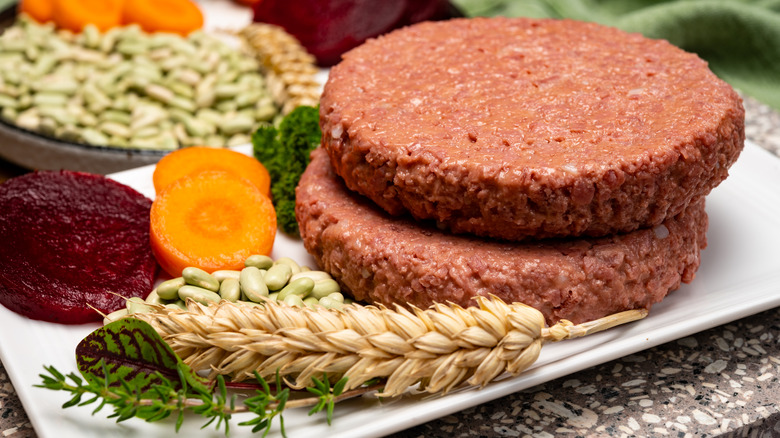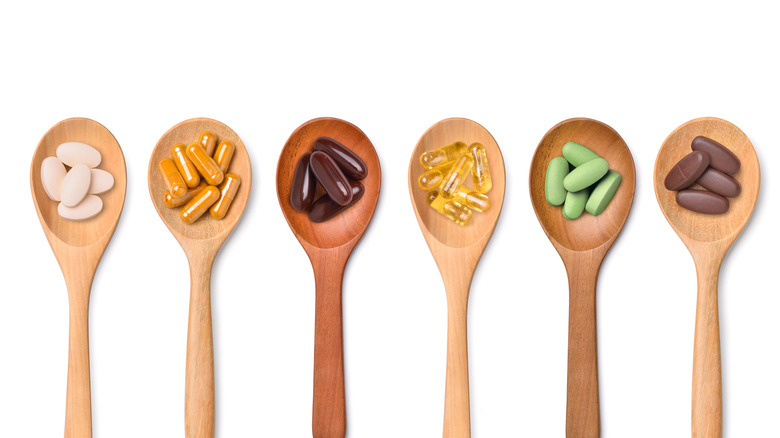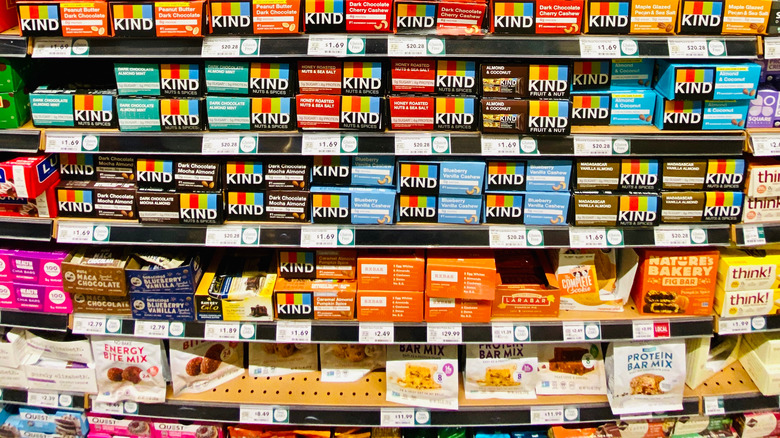When You Eat A Protein Bar Every Day, This Is What Happens To You
Protein bars are a popular and convenient way to add more protein to your diet. They're a great source of vitamins and nutrients and can easily be eaten on the go — but are they actually good for your health?
Protein is an essential part of a well-balanced diet and plays a vital role in the way your body functions (via Verywell Fit). Protein is necessary for the production of antibodies, blood, connective tissue, enzymes, and hair. Protein can even help you build muscle mass. Although it's better to rely on your diet for your daily intake of protein by eating meat, fish, poultry, eggs, or plant-based sources of protein, protein bars may be a good option when you don't have time to sit down and eat a meal or when you need a quick, post-workout snack.
Whether and to what extent a particular protein bar would be beneficial to your daily diet depends not only on its nutritional profile, but also on why you're eating it, what other foods comprise your daily diet, and what your nutritional requirements are based on your body and level of activity (via Healthline). If that sounds complicated, have no fear, because we're about to take all of that into consideration as we break down the various things that can happen when you start eating a protein bar every day.
A daily protein bar could help you boost your protein intake
Protein fuels cell growth and repair and is considered the "building block" of the human body, via Medline Plus. Not consuming enough can lead to tissue breakdown, per WebMD, but consuming too much may overburden various bodily systems and can even raise your risk of developing certain cancers, according to a 2013 study published in ISRN Nutrition.
Fortunately, your baseline protein needs are easy to calculate. Based on the existing body of scientific knowledge, the National Academy of Medicine recommends that adults consume around 7 grams of protein daily for every 20 pounds of body weight, according to Harvard T.H. Chan School of Public Health. Or to put it another way, for every 100 pounds you should consume 35 grams of protein per day, which is roughly the amount found in a four-ounce serving of chicken or turkey meat, per Verywell Fit.
The average protein bar delivers between 10 and 20 grams of protein — but some may deliver just a fraction of that, while others may contain upwards of 30 grams per serving, per Healthline. Therefore, it's important to know your protein requirements and to look at the nutrition label of your chosen protein bar to determine if it's meeting your needs.
A daily protein bar can boost your vitamin and mineral intake
In addition to being a supplementary source of protein, many protein bars also boast some level of micronutrient supplementation, per Healthline. Healthline points out that many protein bars are a good source of vitamin E and various B vitamins, as well as the following minerals: iron, calcium, magnesium, potassium, phosphorus. Because different protein bars contain their own unique array of vitamins and minerals, you'll need to check the label to know precisely what's inside yours and how it might fit into your diet.
That said, health experts seem to prefer that we get our micronutrients from a varied, well-balanced diet, per the National Institutes of Health (NIH). Relying on supplementation — in any form, including protein bars — as opposed to eating a diet that satisfies your vitamin and mineral requirements, may deprive you of some of the benefits of whole foods per SF Gate. Such benefits include the fiber, various antioxidants, and other natural substances found in fruits and vegetables. Further, as SF Gate points out, some vitamins and minerals can be more harmful than helpful when taken in excessive quantities. These include calcium, folic acid, and vitamin D, per WebMD, all of which may be included in your protein bar of choice.
A daily protein bar can help build muscle mass
Fortunately for fans of protein bars, protein supplementation can support efforts to gain and retain muscle mass — even in the elderly, according to 2019 study published in the Journal of Cachexia Sarcopenia Muscle. As to the ideal source of protein for your protein bar, a 2004 study published in the BMC's Nutrition Journal provided some guidance — at least as to whether whey or soy is superior. In that study, over a nine-week period, male-gendered university students taking a weight-training class were given either a whey or soy-based protein bar, or no protein bar at all. At the end of the study period, muscle mass measurements of all of the study subjects indicated that both forms of protein bar were associated with more muscle growth than no protein bar at all.
Building muscle mass — and having a lean body mass overall — has a positive knock-on effect for health: Having a higher percentage of muscle mass is associated with higher bone density, a reduced risk of injury, healthier joints, and a faster and more efficient metabolism, per U.S. News & World Report.
A daily protein bar may help you to miss fewer workouts
A post workout protein bar can support your post-workout recovery, which is no less important to muscle growth than the workout itself, according to Medical News Today. In fact they're really two sides of the same coin. As you challenge your muscles during your workout, your muscle fibers sustain minor damage — which is normal and par for the course (via University of New Mexico). It is during your post-workout recovery period that those damaged fibers fuse together, which is how your muscles grow. Post-workout protein bars can be a quick and convenient way to give your body the protein it needs to jumpstart the tissue repair that is fundamental to muscle growth. In so doing, your protein bar can also help you to feel less sore and less fatigued, with the upshot being fewer missed workouts and faster gains (via Livestrong).
Soy protein bars, in particular, may be superior in this regard to bars made from other forms of protein, including whey, according to the 2004 study published in the BMC's Nutrition Journal. In that study, both soy- and whey-based protein bars were associated with better muscle growth compared with no protein bar at all. But the study authors speculate that the antioxidants in soy protein, in particular, may further support recovery by mitigating oxidant stress associated with physical exertion — which "appears to contribute to muscle damage and fatigue."
Protein bars help you feel less hungry
The feeling of satiety is important to achieving and maintaining a healthy weight because satiety is what signals to your brain that it's time to stop eating for the time being, according to the authors of a 2017 paper published in Food Hydrocolloids. Perhaps you've heard ad nauseum throughout the years that protein-rich foods offer more in the way of satiety than carbohydrate-rich foods, but it's not just hype, according to Harvard Health Publishing. In fact, Healthline points out that protein is more satiating than carbs or fat. One reason is that protein reduces levels of the hormone ghrelin, which stimulates hunger (ghrelin also encourages fat deposition and the release of growth hormone, according to a 2013 paper published in Clinical Nutrition and Metabolic Care). In addition, protein helps boost levels of peptide YY, higher levels of which are associated with feelings of fullness (per Healthline).
Accordingly, protein bars — which are a good source of protein, per Live Science – can help you feel more satisfied between meals. In fact, you might want to consider supplementing your breakfast with a protein bar, with the goal of consuming at least 28 grams of protein over the course of the meal. According to a 2018 study published in the Journal of Dairy Science, consuming 28 or more grams of protein at breakfast time is associated with reduced feelings of hunger all throughout the day, via Harvard Health Publishing.
You may satisfy your food cravings
The first step toward curbing cravings is understanding they don't necessarily mean you're hungry, per Healthline. Hunger is s physical sensation involving an empty stomach and lack of energy. Cravings focus on a specific food, according to nutritionist Nmami Agarwal, per The Indian Express. Hunger means you'll eat whatever is put out in front of you. Carvings, by contrast, can only be satisfied by the objet de désir. Or can they?
In fact, the variety of protein bars out there is sufficiently broad that if you look around, you can probably find one that offers valuable protein and micronutrient supplementation while also addressing even your most obscure cravings — and quite deliciously, we might add. For example, let's say you're craving Girl Scout Thin Mint cookies. In that case, a 150-calorie Simply Protein Chocolate Mint Whey Bar may satisfy you even more because it contains 15 grams of protein and a mere 3 grams of sugar (per Eat This, Not That!). If it's a cupcake you've been craving, you can opt for a Birthday Cake flavor Quest bar, which packs in 20 grams of protein, 12 grams of fiber, and a mere 4 net carbs per 170-calorie serving, via Quest. There's even a bar to address your "swalty" cravings: the 230-calorie Strong & Kind Honey Mustard bar, which packs in 10 grams of protein and a mere 6 grams of sugar.
The wrong protein bar could leave you craving sugar
One of the things nutrition experts seem to like about Quest protein bars is that they somehow manage to satisfy one's cravings for sweet, creamy, and chewy goodness while delivering 20 grams of plant-based protein and no added sugar, according to Quest's website.
The same cannot be said of all protein bars, unfortunately. As Healthline points out, "many protein bars also contain high amounts of added sugar and use unhealthy sweeteners like high fructose corn syrup, which adds excess fructose to your diet and can increase your risk of fatty liver, obesity, and diabetes when consumed in high amounts." Adding minor insult to more significant injury, protein bars that are high in such sweeteners may have the opposite effect of what you were hoping for — if what you were hoping for was a satisfying snack that won't cause your blood sugar to spike, leaving you feeling voraciously hungry not long after tossing the wrapper.
All of that said, there is some possibility that a no-sugar added protein bar such as Quest's could leave you with lingering cravings for sweet foods, per this 2010 paper published in the Yale Journal of Biology and Medicine. The reason is that the studies discussed in that paper tend to suggest that some artificial sweeteners, including sucralose, which is one of the sweeteners used in Quest protein bars, offers "partial, but not complete, activation of the food reward pathways," leading to further "food seeking behavior."
Protein bars could cause weight gain
If you're seeking to gain weight — whether to build muscle, or on the advice of your doctor for your health — a daily protein bar regimen can be a healthy, delicious, and predictable source of extra calories, per Livestrong. Just make sure the protein bar's ingredient list contains nothing eyebrow-raising from a nutrition standpoint. According to the Mayo Clinic, even if you're seeking to put on weight, you should aim for nutritious foods and try to avoid overdoing it with sugars and unhealthy fats.
On the other hand, if you eat a protein bar every day, it's possible that you could end up gaining weight unintentionally. Even the less calorically dense protein bars — typically in the 100- to 200-calorie range — can contribute to weight gain if you're not mindful about your overall daily calorie count, per Women's Health. And some protein bars contain in the range of 400 calories, according to Livestrong. So when it comes to protein bars, it's important to read the nutritional label to determine whether or not the one you choose will help you accomplish your health and weight goals.
Protein bars may cause you to feel gassy and bloated
The same protein in your protein bar that can help you to feel satiated and in control of your cravings can also leave you feeling gassy, bloated, and unable to comfortably button your pants, per Livestrong. As the Milk Genomics Consortium explains, "proteins take longer to break down in the stomach than carbohydrates, and milk-based proteins like whey, which are commonly the main ingredient in protein bars, [are some] of the slowest digesting proteins of all." Because protein takes its own sweet time to break down in your gut, you may experience gas and bloating.
But protein isn't the only culprit. Livestrong also points out that some protein bars are sweetened with sugar substitutes that are known to cause gas and bloating in some people, including malitol and sorbitol and other sugar alcohols. Moreover, some contain added fiber. Although added fiber is, overall, one of the benefits of including protein bars in your diet, it may take some time for your system to get used to it. According to the Mayo Clinic, if the fiber in your protein bars is causing you digestive woes, you may feel better by increasing the volume of water you're consuming to help your body adjust.
The right protein bar could help you with blood sugar control
"Protein has only a small effect on blood glucose levels," according to Dario Health, which explains that this is because protein has the effect of blunting the body's absorption of sugar from carbohydrates. Accordingly, eating protein bars could conceivably support your efforts to maintain stable blood sugar levels. In fact, lean plant-based proteins such as those found in many protein bars are generally considered to be a wise food choice for people dealing with blood sugar control issues, including people dealing with type 2 diabetes.
Of course, it's important to remember that some protein bars are high in added sugar and simple carbohydrates, which can cause blood sugar spikes (via Verywell Health). According to the certified diabetes care and education specialist behind the Dealing with Diabetes blog, people dealing with diabetes should look for protein bars that contain at least five grams of protein, three grams of fiber, and no more than 30 grams of carbohydrates. Bars such as these have "an appropriate amount of carbs, adequate fiber, and the protein in the bar will slow the absorption of the carbs, favoring a slow rise in blood sugar."
The wrong protein bar could contribute to metabolic issues
According to registered dietitian Trista Best speaking to Eat This, Not That!, the wrong protein bar is one that is high in added sugars. As a rule of thumb, that would include any protein bar that contains more grams of sugar than grams of protein. In addition to the fact that added sugars can cause blood sugar levels to spike (via Verywell Health), they may also contribute to your consuming more calories than your body actually needs, per Women's Health. But there is also a big-picture reason why dietitians like Best advise seeking out protein bars with less sugar: Consuming excess sugar is associated with a higher risk of metabolic syndrome, which is a cluster of conditions that are known to increase your likelihood of diabetes, heart disease, and stroke, as well as fatty liver disease, gallstones, asthma, sleep apnea, polycystic ovarian syndrome, and even some forms of cancer, per Johns Hopkins Medicine.
Adding insult to injury, many of these sequelae can develop even in the absence of weight gain — and even in the absence of consuming excess calories, according to a 2016 paper published in Critical Reviews in Clinical Laboratory Science. In other words, even if your sugary protein bar isn't causing you weight gain, it may still be causing you metabolic harm that could come back to haunt you in various and potentially life-threatening ways.
The right protein bar may be able to boost your mood
Some say the key to boosting mental health is embracing spirituality. Others swear it's physical exercise. Still others maintain that no matter what's eating you, emotional well-being starts with making the right food choices. So, about that last one: Some experts swear that consuming optimal levels of protein can help improve and stabilize mood. For example, Axiom Foods points out that protein's blood sugar-stabilizing effects can help keep anxiety and irritability at bay.
In addition, consuming protein has been linked to higher levels of certain neurotransmitters and hormones that are produced by the body and which are associated with better mood, not to mention improved motivation and focus, via Cleveland Clinic. One is dopamine, which is associated with feelings of pleasure, according to WebMD. Another is norepinephrine, which is one of the substances — along with seratonin — that the class of antidepressants known as SNRIs (seratonin and neurotransmitter reuptake inhibitors) is designed to keep circulating at healthy levels of the body for the purpose of improving mood, energy, and attentiveness, per Verywell Mind.
In addition to providing a meaningful shot of protein, the right protein bar may also contain certain vitamins and minerals that can also help keep depression and anxiety at bay. The Cleveland Clinic notes that the nutrients to look for include vitamins A, B1, B6, B9, B12, and C and the minerals magnesium, potassium, selenium, and zinc.
Your protein bar may contain unhealthy fats
The average protein bar contains around 9 grams of fat, according to Live Science. For the average person on an average 2000-calorie diet, that's 15% of the day's allowance, which isn't problematic in and of itself, particularly if the source(s) of fat include nuts and seeds, per Healthline. However, some protein bars rely on what Healthline describes as "highly processed plant oils" such as palm oil (this saturated fat is what gives Nutella its essential Nutella-ness), peanut oil, canola oil, and soybean oil. All such oils might sound like they come from plants, but they're about as far-removed from plant-based eating as you can get, according to Healthline. Rather than coming from crushed or pressed plant parts, these oils are processed at high temperatures, using man-made chemicals. But if that's not enough to put you off them, consider that these oils are associated with inflammation, which itself is associated with increased risk of heart disease and cancer, per Organic Consumers.
Here is how to choose a healthier protein bar
When you're considering adding a protein bar to your daily diet, remember that behind every protein bar brand is a team of marketing geniuses who have invested significant time and effort in coming up with packaging designed to imbue whatever lays beneath the wrapper with a desirable "heath halo" — the packaging is specifically designed to make you believe the contents are healthy, whether that is true or not. You'll want to steel yourself against any preconceived notions you may have about a product based on its name or health claims.
Then, your first task is to read the label, according to Halle Saperstein, registered dietitian with Henry Ford Health. Keeping in mind what your nutritional needs and goals are, consider the bar's content of protein, fats, carbs, fiber, oils, and sugar. And above all, do keep in mind that some ingredients commonly found in protein bars won't do your health any favors. Specifically, you may want to avoid high-fructose corn syrup, inulin, soy protein isolate, soy lecithin, agave syrup, brown rice syrup, sucralose, and sugar alcohols (via Prevention).















